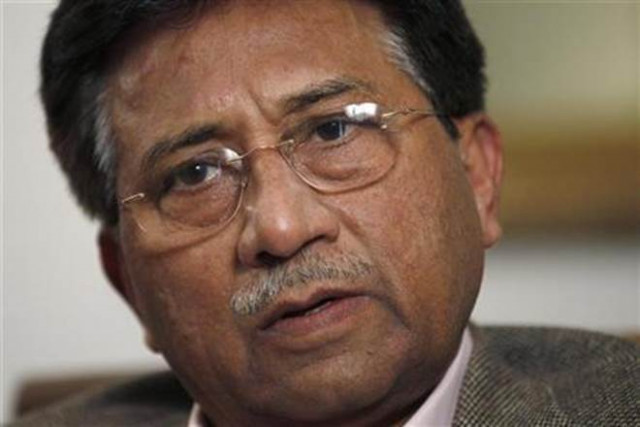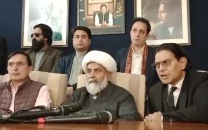Top court directs NADRA to unblock Musharraf's CNIC
Musharraf is summoned before apex court on June 13

Pervez Musharraf. PHOTO: REUTERS
The Supreme Court’s three-judge bench, headed by the CJP, on Monday passed the order after Nadra Chairman Usman Mobin made a verbal request in this regard. Mobin implored that a previous direction by the court for return of Musharraf could not be implemented due to blocking of his identity card.
The SC on Thursday summoned Musharraf to appear before it on June 13 in connection with his petition against the Peshawar High Court (PHC) verdict in 2013 for his lifetime disqualification and assured him that he would not be arrested from the airport till the court premises.
Musharraf can conditionally file nomination papers, says SC
The court had also allowed returning officers to receive his nomination papers but made it clear that acceptance of his nomination papers would be subject to the outcome of the judgement in this case.
On Monday, the CJP said if Musharraf is still a citizen of Pakistan, he should be allowed to come back. He later allowed the Nadra chairman to restore the CNIC and passport of the former president, who is facing multiple cases including a high treason trial for abrogating the Constitution in Nov 2007.
Justice Nisar observed that Musharraf should not have any excuse for not returning to the country and face the cases against him. He observed that the court had already assured him that if he returned he would not be arrested from the airport to the court.
The CJP also expressed concern over delay in reconstitution of a special court holding treason trial of Musharraf. He observed that it seemed that the government wanted to benefit someone.
The chief justice directed the federal government to notify the special court within two days so that the treason trial against Musharraf could be resumed. Political parties have expressed concerns over the court’s directives ‘in favour of Musharraf’.
Nadra on Thursday suspended Musharraf’s CNIC and passport, rendering him unable to travel in any country and making his stay in Dubai also illegal. The suspension had taken place on the March 2018 order of the special court, holding Musharraf’s high treason trial.
Fugitive has no right to audience in courts: AGP
Meanwhile, Attorney General for Pakistan (AGP) Ashtar Ausaf Ali on Monday supported lifetime disqualification of Musharraf as the apex court resumed hearing of the former president’s plea against the PHC’s 2013 verdict for his lifelong disqualification.
“A fugitive in the eyes of the law has no right to an audience before the courts. Thus, a person who does not submit to the jurisdiction and due process of the courts cannot be entitled to relief from the same,” said the AGP in his written response.
Nawaz smoulders as SC allows Musharraf to contest elections
In April 2013, the PHC had permanently disqualified Musharraf for imposing emergency and proclaiming provisional constitutional order (PCO) on November 3, 2007. The AGP wrote that allegations against Musharraf are numerous, including placing judges under house arrest, suppressing the media and demolishing the judicial set-up.
The PHC decision, he stated, was in consonance with what was upheld by the Supreme Court in a multitude of cases. He added that the apex court had ruled that the effect of a declaration against an elected candidate rendered him disqualified forever.
It was also a fact that a declaration passed against the candidate rendered his candidature stigmatised for the remainder of his lifetime, he noted.
Citing a recent SC ruling, the AGP stated that a larger bench of the apex court had settled the law in a judgement reported as PLD 2018 SC 405 whereby a declaration against the honesty of a person in terms of Article 62 and 63 would render him incapable of contesting elections for the duration of his lifetime.
For the purposes of electoral qualifications, he said, the disqualification would persist as long as the decree existed and ‘cannot lapse by any period of time’. “A case instituted by a fugitive is liable to be dismissed without delving into the merits of the same,” he stated.
Citing the PHC order, he pointed out that the court had established that Musharraf had subverted the Constitution, which was punishable under Article 6(2) of the Constitution and ‘under the High Treason Act, he is likely to earn the penalty of death’.
The court order had stated that “the clear promises made with and undertaking given to the then MMA government” that he would relinquish his military powers by December 2004 “were broken by him and he remained in uniform for years thereafter. Hence, in view of broken promises … he [Musharraf] can neither be held to be an ‘Ameen’ nor ‘Sadiq’, therefore, he is liable to be disqualified.”
The attorney general stated that if the court took up Musharraf’s petition, it could result in the setting aside of the PHC judgment. “The instant petition is liable to be dismissed as non-maintainable and without merit,” he added.



















COMMENTS
Comments are moderated and generally will be posted if they are on-topic and not abusive.
For more information, please see our Comments FAQ